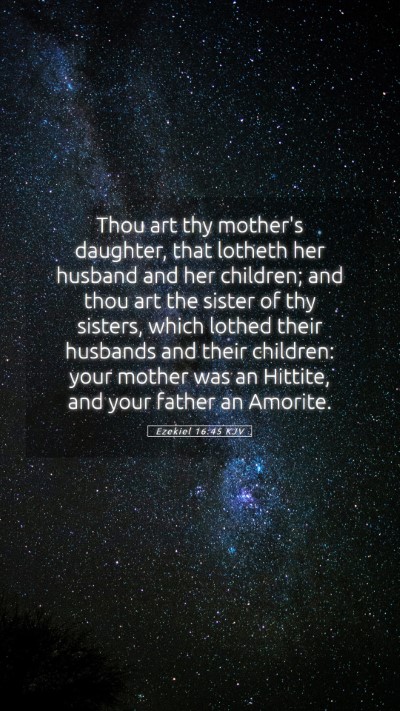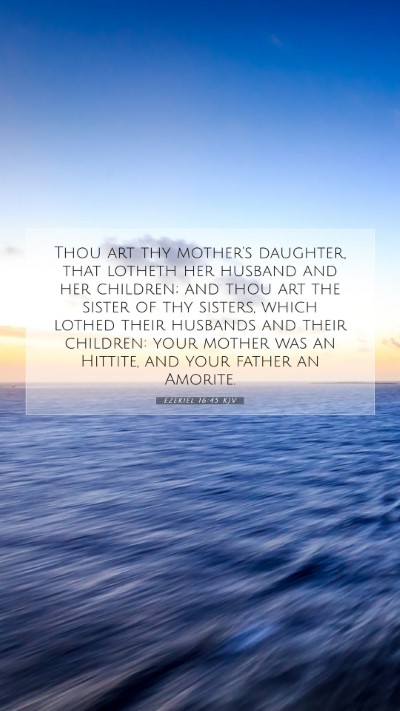Bible Verse Meaning and Commentary: Ezekiel 16:45
Verse: Ezekiel 16:45 - "Thou art thy mother's daughter, that lotheth her husband and her children; and thou art the sister of thy sisters, which lothed their husbands and their children: your mother was an Hittite, and your father an Amorite."
Understanding Ezekiel 16:45
This verse is part of a larger metaphorical exposition by the prophet Ezekiel, addressing the sinful nature of Jerusalem. By referring to Jerusalem as the "daughter" and "sister," Ezekiel emphasizes the close familial connection between the people of Jerusalem and their ancestors, who were known for their idolatrous practices. This verse delves into the theme of betrayal, reflecting on the unfaithfulness of Jerusalem to God.
Bible Verse Interpretations
The commentaries by Matthew Henry, Albert Barnes, and Adam Clarke offer valuable insights into this verse:
- Matthew Henry: Henry emphasizes that Jerusalem's relationships are characterized by disloyalty and rejection, similar to that of its ancestors. He notes the metaphor of Jerusalem as being akin to a family member who dishonors their ancestry by engaging in vile practices.
- Albert Barnes: Barnes highlights the implications of the identities referenced in the verse. He points out that the mother's heritage as an Hittite and the father's as an Amorite represent the foreign nations surrounding Israel, known for their abominable worship of idols. This serves to illustrate the people of Jerusalem’s origins and their spiritual decline.
- Adam Clarke: Clarke analyzes the significance of familial ties in the spiritual disloyalty displayed by Jerusalem. He stresses that despite the physical lineage, the spiritual state of the people reflects their rejection of God's covenant and faithfulness.
Comprehensive Analysis
This verse invites an in-depth biblical exegesis, bridging the cultural and historical context with contemporary understanding. It conveys the rebuke received by the people not only for their actions but for their long-standing lineage of unfaithfulness. Understanding this verse requires a keen look at:
- Historical Context: The significance of Jerusalem's identity rooted in the Hittite and Amorite lineage underscores the struggles the Israelites faced with neighboring cultures and their influences.
- Symbolism: Here, families represent spiritual states—betrayal of God's love through idolatry is a grave sin that the prophet emphasizes as both a present and inherited issue.
- Lessons for Today: Believers can draw parallels from this to their own lives, reflecting on loyalty to God and avoiding the allure of surrounding cultures that promote practices contrary to divine teachings.
Applying Bible Verses to Daily Life
The essence of Ezekiel 16:45 serves to remind believers about the importance of faithfulness and the impact of cultural heritage. It stresses that while one may share a lineage that speaks of past disloyalties, they are called to a greater fidelity to God through their actions and choices.
Additional Bible References
- Ezekiel 16:2 (God's message to Jerusalem)
- Jeremiah 3:6-10 (Israel's unfaithfulness compared to a wife)
- Hosea 1:2 (the theme of marital infidelity and idolatry)
Conclusion
This verse is a poignant reminder of the struggle against unfaithfulness and the call to return to God in sincere devotion. Through careful study and interpretation of Scripture, we can uncover deeper meanings in biblical texts that speak to our spiritual conditions today.
For those engaged in Bible study groups or seeking Bible study insights, exploring verses like Ezekiel 16:45 can cultivate profound discussions regarding fidelity, heritage, and spiritual growth.


